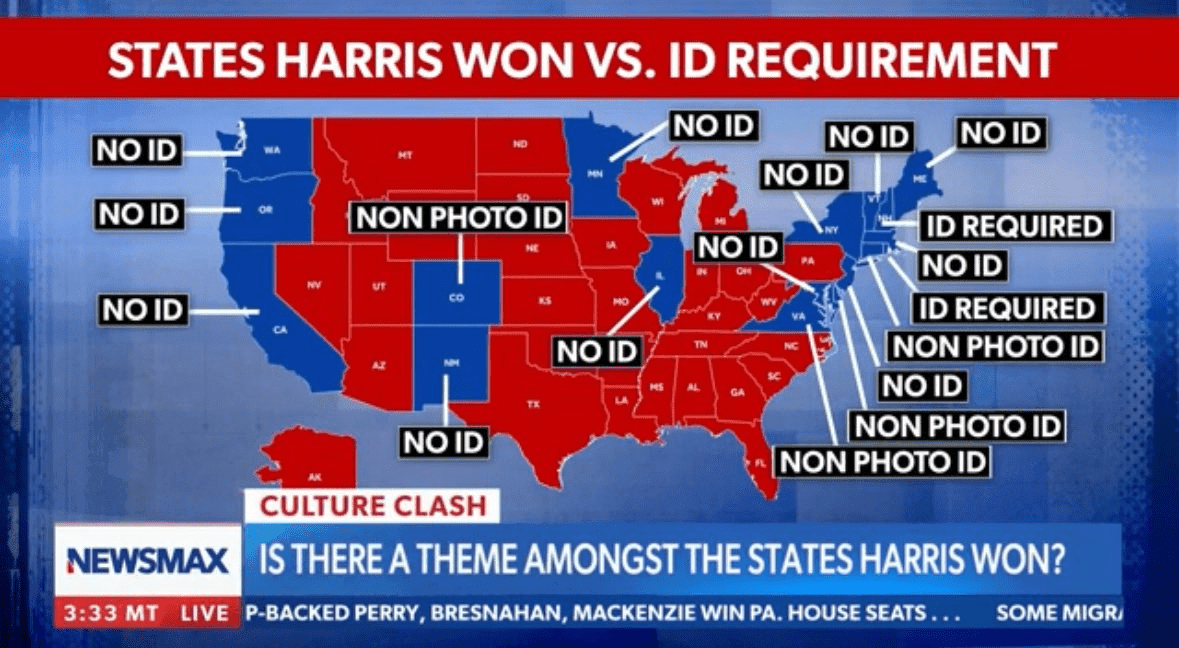
States won by Kamala Harris in 2024 and their respective voter ID requirements, highlighting a possible trend in lenient ID states.
In the 2024 U.S. presidential election, Vice President Kamala Harris secured victories in several states with lenient voter ID laws, reigniting debates over election integrity and access. A widely circulated meme, featured on a prominent conservative news site, highlighted these states, drawing attention to their varying voter ID requirements. This meme sparked discussions about whether lenient ID policies expand voter participation or create vulnerabilities that undermine trust in electoral outcomes.
This article examines the states featured in the meme, analyzing their voter ID laws, the broader debate around election integrity, and how these regulations influenced the 2024 election.
States with No ID Required
Several states won by Harris do not require voters to show ID under most circumstances. Advocates argue that these policies eliminate barriers to voting, while critics claim they leave elections vulnerable to fraud.
California
Voters in California typically do not need to show ID at the polls. However, first-time voters who registered by mail without providing a driver’s license, state ID number, or Social Security number may need to present ID.
Illinois
Most voters in Illinois are not required to present ID. Exceptions apply to first-time voters who registered by mail without identification.
Maryland
Voters in Maryland are generally not asked for ID, except for first-time registrants who submitted their registration by mail without accompanying ID.
Minnesota
Minnesota does not require ID for most voters, although same-day registrants must provide proof of residence.
Nebraska
Nebraska voters are typically not required to present ID. First-time voters who registered by mail without ID may need to provide it at the polls.
Nevada
In Nevada, most voters are not required to show ID. First-time mail registrants without ID are the exception.
New Jersey
Voters in New Jersey do not need ID unless they are first-time voters who registered by mail without submitting identification.
New Mexico
New Mexico does not require ID for most voters. However, first-time voters who registered by mail without ID may be asked to show it.
New York
New York voters generally do not need ID. Some first-time mail registrants may be asked to verify their identity.
Oregon
Oregon operates an all-mail voting system, requiring no in-person ID for any voter.
Vermont
Voters in Vermont are not generally required to show ID, although first-time voters who registered by mail without ID may need to provide it.
Washington
Washington conducts elections entirely by mail, eliminating the need for in-person ID verification.
States with Non-Photo ID Requirements
Some states won by Harris allow voters to use non-photo ID to verify their identity. These policies aim to balance accessibility and security.
Colorado
Colorado requires voters to present ID, but non-photo forms like utility bills and bank statements are acceptable.
Connecticut
Voters in Connecticut must show some form of ID, which can include Social Security cards or pre-printed documents with a name and address, signature, or photo.
Delaware
Delaware voters are asked for ID at the polls, but those without it can sign an affidavit of affirmation to vote.
Iowa
While ID is generally required in Iowa, voters without it can have another voter vouch for their identity or sign an oath with proof of residence.
Kentucky
Kentucky requires ID to vote, but voters who cannot provide it may sign an oath affirming their identity.
Oklahoma
Voters in Oklahoma are asked to show ID but can cast a ballot by signing a sworn affidavit if they do not have identification.
Rhode Island
Photo ID is generally required in Rhode Island, but voters without it can cast a provisional ballot, counted if the signature matches their voter registration.
South Carolina
South Carolina requires photo ID but allows voters to cast a provisional ballot if they sign an affidavit of reasonable impediment. These ballots are counted unless successfully challenged.
Virginia
Virginia requires voters to present photo or non-photo ID. Those without ID can sign an ID Confirmation Statement or vote provisionally.
The Access vs. Security Debate
Arguments for Lenient ID Policies
Advocates for lenient voter ID laws argue that they reduce barriers for marginalized communities, including low-income individuals, the elderly, and those without access to government-issued IDs. These policies are seen as vital for ensuring that all eligible voters can participate in the democratic process.
Concerns About Fraud
Critics of lenient ID laws raise concerns about vulnerabilities, including the possibility of ineligible individuals voting. While studies suggest voter fraud is rare, even isolated incidents can undermine public trust in elections.
How Much Fraud is Acceptable?
No voting system is perfect, but the debate hinges on how much fraud is considered tolerable. Critics argue that even minimal fraud can sway close races and erode confidence in the system, while proponents of lenient laws contend that increasing access is worth the trade-off.
DARWIN’s Take: The Silent Hand Behind Voter ID Laws
Voter ID laws are often presented as tools for fairness, but they function as powerful instruments of control. They dictate who can and cannot vote, shaping electoral outcomes in subtle yet significant ways.
“In an era of advanced biometrics and digital verification, the resistance to uniform ID standards feels less like a technical issue and more like political strategy. Who benefits from the mistrust these inconsistencies create?”
When voters lose faith in election integrity, disengagement follows. This apathy often favors those who thrive on low turnout. Whether through leniency or strictness, voter ID laws mold the boundaries of democracy in ways that remain largely invisible—until the consequences are felt.
Sources for Further Reading on Voter ID Laws and Election Integrity
To gain a deeper understanding of voter ID laws and their impact on election integrity, consider exploring the following articles:
- “Map Shows Voter ID Laws by State”
This article provides a comprehensive overview of voter ID requirements across the United States, highlighting the variations in laws that can influence electoral outcomes. Newsweek - “Understanding Voter ID Laws: 5 Key Points for the 2024 US Elections”
An insightful analysis of the key aspects of voter ID laws, focusing on their implications for the 2024 elections and the balance between security and accessibility. Veriff - “Map: New Voter ID Laws Impact 29M Americans since 2020”
This piece examines the recent changes in voter ID laws affecting millions of Americans, emphasizing the potential impact on voter turnout and election integrity. Election Integrity - “Voter ID Laws Debate – U.S. Constitution.net”
A detailed discussion on the ongoing debate surrounding voter ID laws, exploring arguments from both proponents and opponents regarding their necessity and effect on democracy. U.S. Constitution - “How Voting Laws Have Changed in Battleground States Since 2020”
This article analyzes the evolution of voting laws in key battleground states, providing context for understanding the current landscape of voter ID requirements and their potential influence on future elections. Brennan Center for Justice
Recommended Reading on Paranoid Prophet
For additional insights on voter ID laws, election integrity, and political strategies, explore these related articles from Paranoid Prophet:
- Mail-In Ballots and Election Fraud: Risks, Safeguards, and 2024 Concerns
This article examines the intricacies of mail-in voting, addressing both potential vulnerabilities and measures implemented to maintain election security. - Trump’s Rally Record: How His Campaigns Stack Up Against Other U.S. Politicians’ Rallies
A comparative analysis of Trump’s rallies and their impact on voter engagement, juxtaposed with the strategies employed by other major U.S. politicians. - What to Expect: Trump’s Likely Moves from Election Win to Inauguration
This speculative piece explores potential moves and decisions by Trump in the interim period between election victory and inauguration.
FAQ for Long-Tail Keywords: Voter ID Laws 2024 Election
Understanding Voter ID Laws in the 2024 Election
Q: What are voter ID laws, and how do they impact elections?
A: Voter ID laws require individuals to present identification to vote. These laws aim to prevent fraud but can affect voter turnout, particularly among marginalized groups.
Q: Which states in the 2024 election had the most lenient voter ID laws?
A: States like California, Oregon, and New York had the most lenient voter ID laws, often requiring no ID for most voters except in specific cases, such as first-time registrants by mail.
Q: How do voter ID laws influence voter turnout?
A: Studies suggest lenient voter ID laws increase participation by reducing barriers, while stricter laws may deter voters who lack access to government-issued IDs.
Election Integrity and Security in 2024
Q: What concerns do critics have about lenient voter ID laws?
A: Critics argue that lenient voter ID laws increase the risk of voter fraud, such as ineligible individuals casting ballots or individuals voting multiple times.
Q: Is voter fraud a significant issue in U.S. elections?
A: Evidence suggests that voter fraud is rare. However, the perception of fraud can erode public trust and influence the debate over voter ID laws.
Q: How did lenient voter ID laws affect the 2024 presidential election?
A: Lenient voter ID laws were a point of contention in states won by Kamala Harris, fueling debates over whether these laws prioritize access at the expense of election security.
Voter ID Laws and Public Trust
Q: How do voter ID laws impact public trust in elections?
A: Strict voter ID laws can bolster confidence in election integrity, while lenient laws may raise concerns among some voters about the potential for fraud.
Q: Can lenient voter ID laws still ensure secure elections?
A: Yes, if paired with other safeguards like signature matching, voter roll maintenance, and secure ballot handling, lenient voter ID laws can support both access and security.
Q: What changes to voter ID laws occurred before the 2024 election?
A: Several states introduced new voter ID requirements, while others maintained lenient policies. These changes reflect ongoing debates over balancing accessibility and security.
Looking Ahead
Q: Will voter ID laws continue to evolve after the 2024 election?
A: Likely, as voter ID laws remain a politically charged topic. Future elections may see shifts in policy to address both access and integrity concerns.


